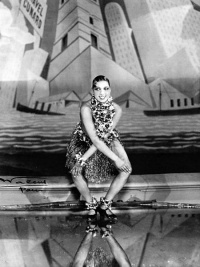Music of the African diaspora
From The Art and Popular Culture Encyclopedia

|
"[the term] black music' is much more common than 'white music', probably for the same sort of reasons that expressions like 'women's history' or 'women's music' would cause far fewer eyebrows to be raised than 'men's history' or 'men's music' [...]. Such terms are relative to the hegemony of the culture of their user, so 'men's music' and 'white music' will sound stranger in a culture dominated by white males than 'women's music' or 'black music'." --Philip Tagg Black music and violence: It has parallels with the violence in hip hop (think 2Pac, think The Notorious B.I.G.). Both are fueled by machismo (see hip hop feuds) and have homophobia and misogyny as side effect (see homophobia and black music and misogyny in hip hop culture). "The irony of Anglo-Euro synthpop is that, for all its whiteness (DAF loved disco but prided themselves on not sounding black), it had a huge impact on black America. DAF and their offshoot group Liaisons Dangereuses influenced the embryonic black electronic sounds of Chicago house and Detroit techno, while Kraftwerk almost single-handedly inspired New York electro."--Rip It Up and Start Again (2005) by Simon Reynolds "Now with Negro jazz beginning to emigrate from New Orleans, let us examine the white jazz of that city. This music, which is called Dixieland, is an interesting cultural phenomenon. It is the first instance of a sincere adoption by the white man of an Afro-American art and, so far as I am able to estimate, it remains the sole instance."--Shining Trumpets, a History of Jazz (1946) by Rudi Blesh, p. 204 "Within the distinct worlds of reggae, jazz, and funk, Lee Perry, Sun Ra, and George Clinton have constructed worlds of their own, futuristic environs that subtly signify on the marginalization of black culture. These new discursive galaxies utilize a set of tropes and metaphors of space and alienation, linking their common diasporic African history to a notion of extraterrestriality." --Extended Play (1994) by John Corbett |

(Photo by Walery)
|
Related e |
|
Featured: |
Music of the African diaspora is the academic term for black music. Much of the music of the African diaspora was refined and developed during the period of slavery. Slaves did not have easy access to instruments, so vocal work took on new significance. Trough chants and work songs people of African decent preserved elements of their African heritage while inventing new genres of music. The culmination of this great sublimation of musical energy in to vocal work can be seen in genres as disparate as gospel music and hip-hop. Despite efforts to erase African cultural elements in the United States traditions of melody also survived. (Metaphors of contagion, such as "infectious rhythm" were used to describe the spread of African culture by majority cultures.)
Contents |
Caribbean
Cuba and Latin music in the Caribbean
The roots of most Cuban musical forms lie in the cabildos, a form of social club among African slaves brought to the island. Traditional Afro-Cuban styles, include son, Batá and yuka and Rumba.
Former British West Indies and the Lesser Antilles
Jamaica
Early forms of African-Caribbean music in Jamaica was Junkanoo, (a type of folk music now more closely associated with The Bahamas), the quadrille (a European dance) and work songs were the primary forms of Jamaican music at the beginning of the 20th century. These were synthesized into mento music, which spread across the island. In the 20th century influences from the United States were fused to create the uniquely Jamaican forms dancehall and ska. Subsequent styles include reggae, rocksteady and raggamuffin.
Lesser Antilles
As is the case throughout the Caribbean, Lesser Antillean musical cultures are largely based on the music of African slaves brought by European traders and colonizers. The African musical elements are a hybrid of instruments and styles from numerous West African tribes, while the European slaveholders added their own musics into the mix, as did immigrants from India.
The ex-British colonies include Trinidad and Tobago, whose calypso style is an especially potent part of the music of the other former British colonies, which also share traditions like the Big Drum dance. Trinidadian folk calypso is found throughout the area, as are African-Caribbean religious music styles like the Shango music of Trinidad. Calypso's early rise was closely connected with the adoption of Carnival by Trinidadian slaves, including camboulay drumming and the music masquerade processions. In the 1970s, a calypso variant called soca arose, characterized by a focus on dance rhythms rather than lyricism. Soca has since spread across the Caribbean and abroad.
Steel drums are a distinctively Trinidadian ensemble that evolved from improvised percussion instruments used in Carnival processions. Steel bands were banned by the British colonial authorities. Nevertheless, steel drums spread across the Caribbean, and are now an entrenched part of the culture of Trinidad and Tobago.
The French islands of Martinique and Guadeloupe share the popular zouk style and have also had extensive musical contact with the music of Haiti, itself once a French colony though not part of the Lesser Antilles. The Dutch colonies of Curaçao, Bonaire and Aruba share the combined rhythm popular style. The islands also share a passion for kaseko, a genre of Surinamese music; Suriname and its neighbors Guyana and French Guiana share folk and popular styles that are connected enough to the Antilles and other Caribbean islands that both countries are studied in the broader context of Antillean or Caribbean music.
Black music 'stole' by white musicians
- "Highway Robbery across the Color Line in Rhythm and Blues" (1955) by Langston Hughes
- "Because they're anti-Negro, that's why" by Alan Freed
- "Ripping Off Black Music" (1973) by Margo Jefferson
See also

